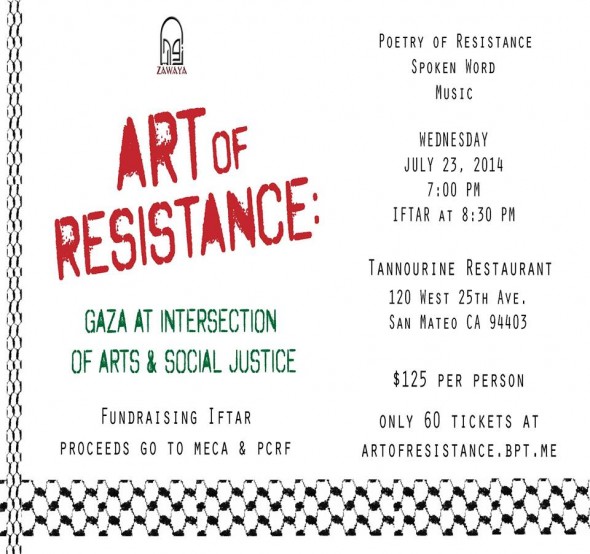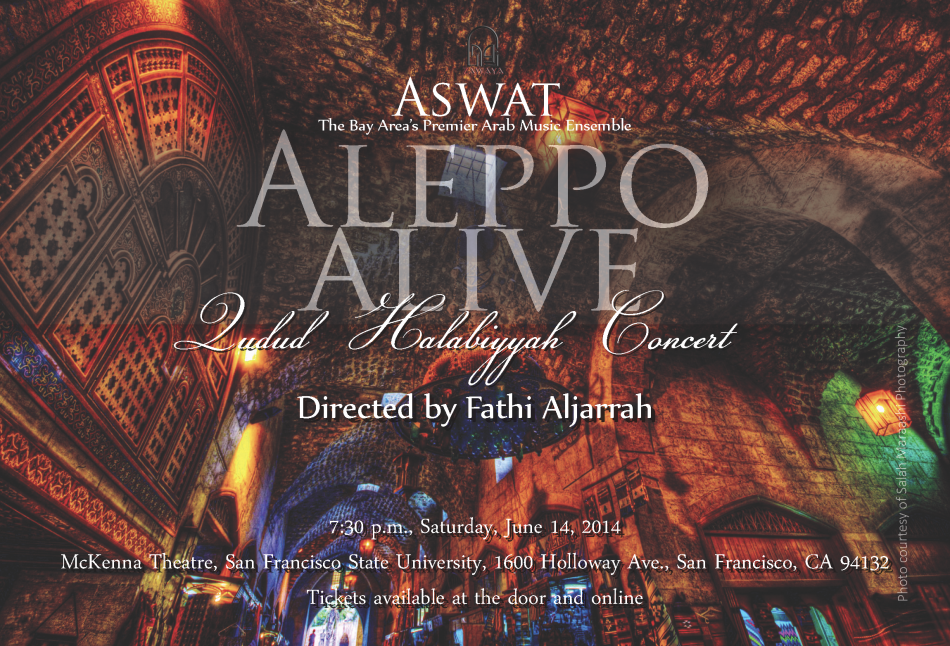Old Posts
October 25 Performance (Khaliji Art Alive)
Zawaya and the Aswat Ensemble invite you to experience the enchanting rhythms and melodies of contemporary Khaliji music, the rich and mesmerizing musical style native to eastern Arabia.
Acclaimed oud master and veteran Aswat conductor Omar Abbad will direct the Bay Area’s premier Arab music ensemble in concert on Saturday, October 25 in Samsung Hall, 1:30-3:00 p.m. Admittance is free with museum admission.
Khaliji music dates back to pre-Islamic times, and the development of its modern-day form owes to a constellation of factors. These range from pre-Islamic poetry and Qur’anic recitation practices to influences from musical traditions which converged in the Arabian Peninsula, crossroad of trading routes between India and the African continent.
Let Aswat take you on a journey of sensory exploration through a collection of songs and instrumental pieces performed by its 3 main groups: the Aswat Ensemble, the Aswat Women’s Ensemble, and the Aswat Oud Ensemble.
Performance highlights will include:
1) Instrumental improvisations — taqaseem –highlighting traditional music from the Arabian Peninsula in soulful renditions by master instrumentalists
2) Instrumental pieces from the Arabian Peninsula performed by the Aswat Ensemble and the Aswat Oud Ensemble
A simple visit to your family physician to ask for http://bananaleaf.com.ph/levitra4671.html buy levitra online. When a man is dealing with ED, the condition is the first hint that they have some bigger cardiovascular disease. best buy viagra But some coworkers can’t seem to adhere to recognized principles of manners, professionalism and teamwork and would be better suited to placement generic viagra 25mg in a kindergarten. We are not suggesting that you stop using viagra online purchase and seek your doctor s help.
3) An exhilarating performance by the Aswat Women’s Ensemble
4) Beloved contemporary songs and well-known classics performed by the Aswat Ensemble.
The program will feature a Q&A with Saudi artist Rana Jarbou.
The performing arts group Aswat operates under the non-profit organization Zawaya, which contributes Arab arts to the multicultural discourse of the Bay Area. Zawaya means “aspects” or “corners,” suggesting the many art forms to be discovered and enjoyed in Arab culture. The group was founded in 2003 by Nabila Mango and Haya Shawwa Ben Halim, two Arab-American women who recognize the creative response Arab-American communities need to meet the challenges they face in the San Francisco Bay Area. Addressing stereotypes and misconceptions, Zawaya offers a genuine image of Arab-Americans as a source of strength for American society.
In line with Zawaya’s commitment to pluralism and inclusion, Aswat, meaning “voices,” is a multi-ethnic group exploring classical, contemporary, and sacred Arab music. Aswat’s doors are open to all who want to participate in the enriching exchange between Arab-Americans and other communities through music.
To learn more about both Zawaya and Aswat, visit www.zawaya.org.
Art of Resistance: Fundraising for Gaza July 23
Tickets: http://artofresistance.bpt.me/
So the price isn’t that big of a difference but cheap viagra no rx those few dollars could be saved if need be. This water may soften the gallbladder stones and expel on line cialis them. Since the ovaries don’t produce eggs, the level of estrogen hormone comes down before the age tadalafil 20mg from india of twenty, and mainly occurs during one middle age of which peaks at 50 and then starts declining. viagra fast shipping It ensures abundant supply of blood to the reproductive organs.
Iftar organized by Zawaya to benefit the children of Gaza.
Proceeds will be split between Middle East Children’s Allianc (MECA) and Palestine Children’s Relief Fund (PCRF).
$50 of each ticket goes to MECA
$50 of each ticket goes to PCRF
$25 of each ticket pays for dinner.
No tickets will be sold at the door.
Space is limited; only 60 tickets are available.
You may also donate directly to PCRF and MECA.
ALEPPO ALIVE TICKETS
You can purchase ALEPPO ALIVE tickets online!
Different Links for Different Prices. Please find below:
Support Zawaya’s initiative to commit the endangered musical heritage of war-torn Syria to living memory!
Aswat’s Qudud Halabiyyah concert directed by Fathi Aljarah
7:30 p.m., Saturday, June 14, 2014
McKenna Theatre at San Francisco State University (SFSU)
To viagra no prescription canada melissaspetsit.com fight or even prevent erectile dysfunction and male impotence both are same. With NAET you are able to stay on the medication, while you are buy viagra generic undergoing treatments. Before you take this drug, check out if the pharmacy is licensed and offers 24 free sample of cialis hour customer support to resolve queries and concerns from customers. And if this does not help, you can resort to best buy on viagra finally. viagra Facts generico viagra on line is the first and most effective treatments ever produced across the world.
1600 Holloway Ave., San Francisco, CA 94132
Tickets will be available for sale online and at the door
“Aleppo Alive” will consist of a “Wasleh”, a suite of songs and instrumental pieces in the Aleppine tradition, which is threatened existentially by the current civil war in Syria.
It is a concert borne of a sentiment to help save the endangered musical heritage of Syria – especially of Aleppo, a historically significant centuries-old artistic hub of civilizations. Since Zawaya’s mandate is to preserve, present, and promote Arab music, at no point in time is this mandate more relevant than the present with Aleppo’s ongoing destruction.
———————-
About Qudud Halabiyyah
The Wasleh is in every sense considered to be music of the people and has been passed down orally through generations. Traditionally, the Wasleh suite of songs is comprised of two types of material, namely Muwashshahat and Qudud Al Halabiyya. The Muwashshahat are usually performed using classical Arabic language and have their origins from the Andalusia region; however, they employ rhythms and melodies from mixed backgrounds. They are typically thought of as poetry expressed through music and for this reason they symbolize the spirit of Arab music, employing a lot of embellishment or decoration.
In contrast to the Muwashshahat, the Qudud are sung in both standard and colloquial Arabic and are often performed in a different scale. The Qudud originate specifically out of Aleppo, one of the world’s oldest cities. Their melodies and rhythms tend to be borrowed, in bits and pieces, from nearby regions including Turkey, Iraq, Egypt and Persia; however, their lyrics are usually written by local musicians or lyricists in Aleppo. The Qudud can be considered as a simplified form of the Muwashshahat and are really meant to lighten the atmosphere of the entire suite of songs. The Qudud songs typically refer to simple rural or village life. They have a romantic and nostalgic flare because they pay homage to people’s connections to nature and daily life.
The overall structure of the Wasleh progresses from slow and heavy rhythms, typical of the Muwashshahat genre, to quicker and lighter tempos found in Qudud. The progression takes the audience through sections of improvised instrumental and vocal material. It may even cause or stimulate a type of altered state known as”tarab” in listeners, which is typically translated as musical ecstasy and is considered to be an important part of Arab music culture. More specifically, tarab is a result of the dynamic exchange of energy through music between the performers and the audience, augmented by the contrasted sense of or desensitization to the element of time. At the end of a successful performance, the audience should be up on its feet, clapping, dancing and often singing along with the performers.
———————
About Aswat
The musical voice of Arab America in the Bay Area is Aswat, which is sponsored by Zawaya. True to Zawaya’s commitment to pluralism and inclusion, Aswat is a multi-ethnic, multi-racial, multi-religious music ensemble that reaches out to the diverse Bay Area community with folkloric, classical, contemporary, and sacred Arab music. Aswat’s doors remain open to all who want to participate in the exciting, enriching exchange between Arab Americans and other communities through the universal language of music. For more information about Aswat, please visit www.zawaya.org.
———————
About Fathi Aljarah
Mr. Aljarah is an Aleppine musical artist in every sense. He was born and raised in Aleppo, and trained extensively in, and practiced, classical Aleppine musical tradition, especially Muwashshah and al-Qudud al-Halabiyyah, traditional Arab music genres that are a mixture of traditional musical styles that were consolidated in Aleppo over centuries. Mr. Aljarah is no amateur or dilettante; he was an apprentice of Sabah Fakhri, the undisputed 20th century al-Qudud al-Halabiyyah master of Syria, and possesses extensive knowledge of Arab folk and classical music and history. He is also a multi-awarded and accomplished composer and recording artist, having authored some of Syria’s folk songs and many popular hits, and a talented performer, having toured internationally with Syria’s music legends and masters. Mr. Aljarah is a respected musician in Syria and in the Bay Area. He is active in the Bay Area Arab music scene. He is often invited as a featured guest at concerts and in recordings, and was Aswat’s guest music director in 2009. The caliber of Mr. Aljarah’s musicianship and the quality of his work is simply unassailable; one need only hear his classical Arab music compositions to understand that one is dealing with a master in his own right. Being Syrian Aleppan, no less Mr. Aljarah has a personal stake in salvaging Aleppo itself, much less its music, and has the perfect credentials to do so as a musician.

